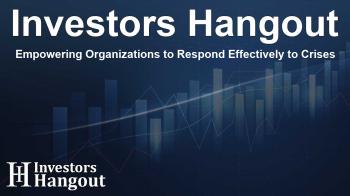Empowering Organizations to Respond Effectively to Crises

Empowering Organizations for Enhanced Crisis Response
In an age where disruptions such as ransomware attacks, cloud service failures, and supply chain challenges are increasingly common, the need for effective crisis management has never been more critical. Info-Tech Research Group, a leader in IT research and advisory, has developed a comprehensive framework aimed at helping organizations move beyond static crisis planning to engage in realistic training that prepares teams for real-world scenarios.
The Importance of Training Over Mere Planning
Info-Tech’s latest research underscores a vital reality: many crisis response plans fail to deliver when tested in the chaos of actual incidents. Often, organizations find themselves struggling to execute well-rehearsed plans during moments of crisis, exposing them to significant operational disruptions and financial repercussions.
The firm advocates for a shift towards structured tabletop exercises designed to enhance practical skills and collaborative response efforts. By simulating real-life scenarios, organizations can foster an environment where teams can safely practice their responses, gaining both confidence and coordination.
The Framework for Effective Crisis Management
Info-Tech proposes a well-defined, four-phase approach to building a robust crisis response program:
- Phase 1: Define Program Objectives
This initial phase requires organizations to establish clear and measurable goals that align with broader operational strategies. It is essential to recognize that the effectiveness of crisis response lies in how well teams prepare through rigorous training, rather than just how well they plan. - Phase 2: Design the Scenario and Plan the Session
Realistic and relevant scenarios are crucial for effective training. Tailored sessions should be crafted to test both technical skills and decision-making capabilities, challenging participants to think creatively and respond swiftly under evolving conditions. - Phase 3: Facilitate Sessions
During this phase, the tabletop exercises are conducted in a controlled and supportive framework. Creating a safe space for trial and error allows teams to identify weaknesses without the fear of repercussions, thus enhancing trust and coordination among departments. - Phase 4: Review Outcomes
After exercises, collecting insights and lessons learned becomes vital for continual improvement. Reviews should focus on refreshing procedures and reinforcing best practices to elevate the organization’s overall response capabilities.
Building a Resilient Organization
Implementing these phases with thoughtful consideration fortifies organizational resilience. By minimizing potential downtime and enhancing regulatory compliance, organizations can better prepare for future challenges. The exercises laid out by Info-Tech convert theoretical plans into actionable strategies, ensuring teams are capable of making decisive moves during actual crises.
As Michel Hébert, a practice lead at Info-Tech Research Group, emphasizes, “The disconnect between planning and execution necessitates immersive training that promotes adaptable decision-making under pressure.” Regular tabletop exercises allow teams to transcend typical playbooks, honing their ability to react dynamically in unpredictable environments.
Join the Conversation and Learn More
For those interested in deepening their understanding of resilience planning, additional resources and exclusive commentary from industry experts are available. Engaging with the full blueprint can empower organizations to implement these crucial practices effectively.
About Info-Tech Research Group:
Info-Tech Research Group is among the foremost research and advisory entities globally, dedicated to serving over 30,000 IT and HR professionals. Their commitment lies in providing unbiased, relevant research and guidance that enables leaders to make informed, strategic decisions. For nearly three decades, Info-Tech has collaborated with organizations to ensure empowered, efficient, and successful operational outcomes.
Frequently Asked Questions
What is the purpose of Info-Tech Research Group's framework?
The framework aims to strengthen organizations' crisis response capabilities through structured training and exercises that simulate real-world scenarios.
Why is training essential in crisis management?
Training prepares teams to effectively tackle unexpected situations, enhancing their agility and confidence in executing plans during actual crises.
What are the four phases of the tabletop approach?
The four phases include defining objectives, designing scenarios, facilitating sessions, and reviewing outcomes to continually improve response capabilities.
How can organizations benefit from tabletop exercises?
Tabletop exercises offer organizations a safe environment to practice responses, identify weaknesses, and foster collaboration among teams.
How does Info-Tech enhance organizational resilience?
By implementing structured exercises, organizations can minimize downtime, boost compliance, and ensure they are prepared to respond effectively when crises occur.
About The Author
Contact Caleb Price privately here. Or send an email with ATTN: Caleb Price as the subject to contact@investorshangout.com.
About Investors Hangout
Investors Hangout is a leading online stock forum for financial discussion and learning, offering a wide range of free tools and resources. It draws in traders of all levels, who exchange market knowledge, investigate trading tactics, and keep an eye on industry developments in real time. Featuring financial articles, stock message boards, quotes, charts, company profiles, and live news updates. Through cooperative learning and a wealth of informational resources, it helps users from novices creating their first portfolios to experts honing their techniques. Join Investors Hangout today: https://investorshangout.com/
The content of this article is based on factual, publicly available information and does not represent legal, financial, or investment advice. Investors Hangout does not offer financial advice, and the author is not a licensed financial advisor. Consult a qualified advisor before making any financial or investment decisions based on this article. This article should not be considered advice to purchase, sell, or hold any securities or other investments. If any of the material provided here is inaccurate, please contact us for corrections.

